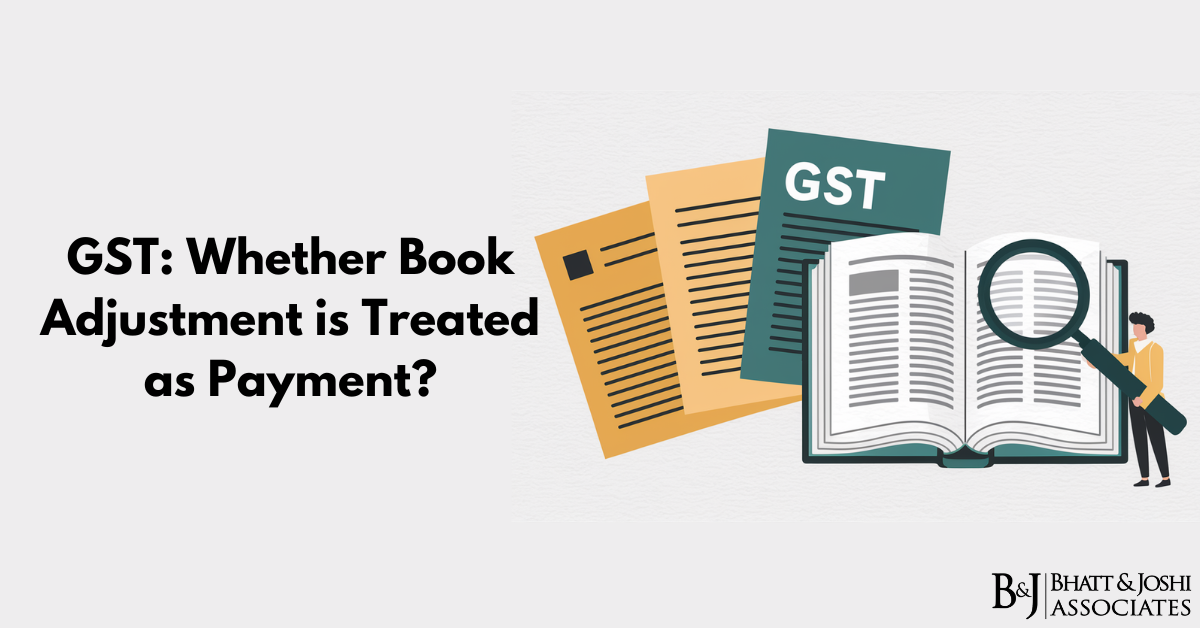Treatment of Book Adjustments as Payments? Understanding GST Eligibility
Introduction
In the contemporary business landscape, characterized by seamless movement of goods and services across states and borders, transactions between associated enterprises, sister concerns, different branches, and headquarters are prevalent. Often, these transactions involve the issuance of GST invoices without actual monetary payments due to the interrelated nature of the parties involved. This raises pertinent questions regarding the eligibility of Input Tax Credit (ITC) under GST laws. In this article, we delve into the legal provisions, regulatory framework, and implications surrounding the treatment of book adjustments as payments for the purpose of availing ITC under the Goods and Services Tax (GST) regime. Under the GST regime, the issuance of GST invoices and the subsequent availing of ITC are integral aspects of the taxation framework. However, in transactions involving related parties or intra-organizational transfers, the actual payment may not occur due to internal arrangements or business strategies. This prompts an examination of whether book adjustments, without actual monetary settlements, qualify as payments for the purpose of availing ITC.
Legal Provision:
Section 16 of the Central Goods and Services Tax (CGST) Act outlines the conditions for availing ITC under GST. The second proviso to Section 16(2), read with Rule 37 of the CGST Rules, mandates that the recipient must make payment to the vendor within 180 days from the date of the invoice to ensure eligibility for ITC. Failure to make timely payments results in the reversal of availed ITC along with interest.
Applicability to Related Parties:
The term “related parties” is defined in the explanation to Section 15 of the CGST Act, encompassing various relationships such as officers or directors of each other’s businesses, legally recognized partners, employer-employee relationships, shared ownership, and control, among others. Transactions between related parties are subject to GST even if no consideration is agreed upon, as per Section 7(1)(c) of the CGST Act read with Schedule I.
Treatment of Transactions without Consideration:
Proviso to Rule 37(1) of the CGST Rules stipulates that where supplies are made without consideration, the value of supply is deemed to have been paid for the purpose of ITC eligibility. Consequently, there is no requirement to reverse credit under Rule 37 in such cases. However, if parties agree to consideration, even if they are related, payment must be made to avoid reversal under Rule 37.
Understanding Payment in GST:
The term “payment” is not explicitly defined under GST laws. However, it generally refers to the act of paying money to someone. In the context of GST, payment entails the transfer of agreed consideration to the supplier/vendor. Section 2(31) of the CGST Act defines consideration broadly to include payments made in money or otherwise, as well as acts or forbearances.
Validity of Book Adjustment as Payment:
Book adjustment, involving the cross-adjustment of accounts payable and accounts receivable without actual monetary settlements, is recognized as a valid mode of payment under GST laws. Various judicial precedents and advance rulings have upheld the validity of book adjustments for settling mutual debts between related parties.
Perspective from Judicial Precedents and Advance Rulings:
In rulings such as Paragon Polymer Products (P.) Ltd. and Senco Gold Limited, authorities have affirmed that settling book debts through adjustments is a valid mode of payment under the CGST Act. These rulings underscore the principle that unless expressly restricted by law, credit of ITC cannot be denied solely based on the mode of payment.
Interpreting Legal Provisions: Book Adjustments’ Role in GST Payments
Conclusion: Implications of Book Adjustments as Payments
In conclusion, the treatment of book adjustments as payments for the purpose of availing ITC under GST is legally valid and substantiated by judicial precedents and advance rulings. Payment, as defined under GST laws, encompasses monetary transactions as well as non-monetary settlements, including book adjustments. Therefore, transactions settled through book adjustments between related parties should not result in the reversal of availed ITC under Section 16 of the CGST Act read with Rule 37 of the CGST Rules. It is imperative for businesses to understand and adhere to these legal interpretations to avoid disputes during GST audits and ensure compliance with GST regulations.
 Whatsapp
Whatsapp


